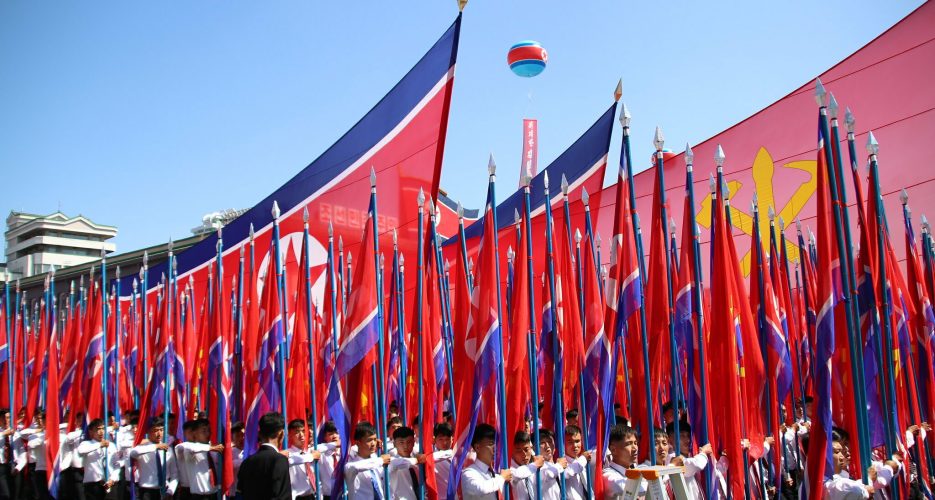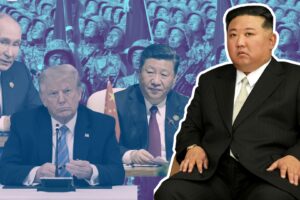Worship and Celebration, from Pyongyang to London This year, as with many other years, has seen a number of widely discussed events. It seems that every week we have something else to discuss and debate. However two events in particular stand out for this author, and it centres on anniversary celebrations held on opposite sides of the world, and reported in very different contexts; the 100th anniversary of the birth of Kim Il-Sung, and the Diamond Jubilee of Queen Elizabeth. While the celebrations held in North Korea were analysed, mocked and reported with the usual array of ‘unique glimpses’ and ‘rare insights’, the celebrations held in London and beyond were generally gushing and complimentary. Perhaps this shouldn’t be surprising; North Korea has long been seen as an abuser of human rights and run as a dictatorship, while the countries which recognise Elizabeth as their Queen are mostly regarded as democratic and upstanding members of this world. With this in mind, it’s worth looking past the headlines and comparing how these two events were reported, and what the event tells us about Western elite attitudes towards what can only be described as two similar, yet very different events.
The first week in June provided a spotlight for the UK, as politicians, citizens and viewers around the world watched and took part in a series of festivities aimed at celebrating the 60th anniversary of Queen Elizabeth as “Her Majesty Elizabeth the Second, by the Grace of God, of the United Kingdom of Great Britain and Northern Ireland, and of Her other Realms and Territories, Queen, Head of the Commonwealth, Defender of the Faith”. That is to say nothing of her numerous other titles, such as “Commander-in-Chief of the British Armed Forces” and “Lord High Admiral of the Royal Navy”. The peak of the weekend was laid out as a river pageant, thousands of boats sailing down the Thames as a tribute to her reign. In essence, more a naval parade than a military one, with on-lookers watching from the riverside rather than the paved streets. In all, the extravagance and celebration is estimated to have cost the economy billions, ranging from £1 billion in the best case to over £3 billion in the worst case.[1] Reaction was understandably mixed, though the majority of it was positive. The BBC devoted an entire section of its webpage to the event[2] and broadcast almost wall-to-wall coverage of proceedings. Other UK media outlets shared in much of the revelry, providing blanket coverage no matter if it was negative or positive. In essence, the UK was bombarded by messages about the royalty, and stretching further, towards discussion of patriotism, nationalism, and of course the future of the monarchy.
This year, as with many other years, has seen a number of widely discussed events. It seems that every week we have something else to discuss and debate. However two events in particular stand out for this author, and it centres on anniversary celebrations held on opposite sides of the world, and reported in very different contexts; the 100th anniversary of the birth of Kim Il-Sung, and the Diamond Jubilee of Queen Elizabeth. While the celebrations held in North Korea were analysed, mocked and reported with the usual array of ‘unique glimpses’ and ‘rare insights’, the celebrations held in London and beyond were generally gushing and complimentary. Perhaps this shouldn’t be surprising; North Korea has long been seen as an abuser of human rights and run as a dictatorship, while the countries which recognise Elizabeth as their Queen are mostly regarded as democratic and upstanding members of this world. With this in mind, it’s worth looking past the headlines and comparing how these two events were reported, and what the event tells us about Western elite attitudes towards what can only be described as two similar, yet very different events.
The first week in June provided a spotlight for the UK, as politicians, citizens and viewers around the world watched and took part in a series of festivities aimed at celebrating the 60th anniversary of Queen Elizabeth as “Her Majesty Elizabeth the Second, by the Grace of God, of the United Kingdom of Great Britain and Northern Ireland, and of Her other Realms and Territories, Queen, Head of the Commonwealth, Defender of the Faith”. That is to say nothing of her numerous other titles, such as “Commander-in-Chief of the British Armed Forces” and “Lord High Admiral of the Royal Navy”. The peak of the weekend was laid out as a river pageant, thousands of boats sailing down the Thames as a tribute to her reign. In essence, more a naval parade than a military one, with on-lookers watching from the riverside rather than the paved streets. In all, the extravagance and celebration is estimated to have cost the economy billions, ranging from £1 billion in the best case to over £3 billion in the worst case.[1] Reaction was understandably mixed, though the majority of it was positive. The BBC devoted an entire section of its webpage to the event[2] and broadcast almost wall-to-wall coverage of proceedings. Other UK media outlets shared in much of the revelry, providing blanket coverage no matter if it was negative or positive. In essence, the UK was bombarded by messages about the royalty, and stretching further, towards discussion of patriotism, nationalism, and of course the future of the monarchy.
Try unlimited access
Only $1 for four weeks
-
Unlimited access to all of NK News: reporting, investigations, analysis
-
Year-one discount if you continue past $1 trial period
-
The NK News Daily Update, an email newsletter to keep you in the loop
-
Searchable archive of all content, photo galleries, special columns
-
Contact NK News reporters with tips or requests for reporting
Get unlimited access to all NK News content, including original reporting, investigations, and analyses by our team of DPRK experts.
Subscribe
now
All major cards accepted. No commitments – you can cancel any time.
© Korea Risk Group. All rights reserved.
No part of this content may be reproduced, distributed, or used for
commercial purposes without prior written permission from Korea Risk Group.
|











